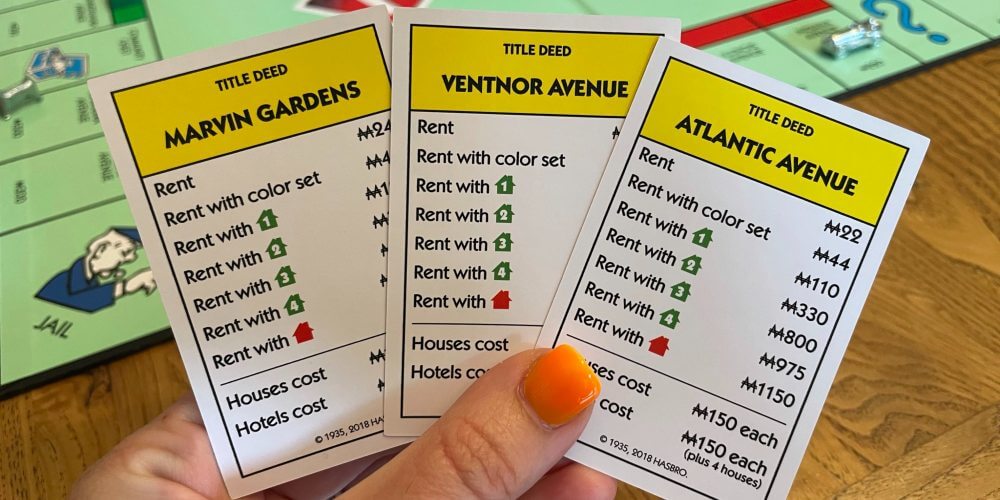

The tagline for Monopoly is ‘Fast-Dealing Property Trading Game’. So why do so many people forget about trading when they play?
Trading is often overlooked but it’s absolutely key if you want to win.
And that doesn’t just mean knowing the rules, but mastering the key strategies you should employ.
So, let’s dive into it – first with the basics, and then the best ways to win at Monopoly through trading.

Monopoly Trade Rules – Essential Info
In Monopoly, you can trade with other players at any time in the game, and you’re allowed to trade properties (including railroads and utilities), cash, and Get Out Of Jail Free cards. There isn’t much in the game that you can’t trade.
Trading isn’t just allowed in Monopoly, it’s actively encouraged. As long as you stick to the rules on what can and can’t be traded, you can make deals with other players at any time.
It’s really important that you make trades, whether you’re the one proposing them or you let other players approach you. Otherwise, the odds of picking up a full color set are extremely slim.
To make a trade in Monopoly, simply name the player you wish to trade with, explain exactly what you’re offering, and exactly what you want in return. The other player can then accept or reject your trade.
While those are the only two official options, it’s more likely that you’ll enter a stage of negotiation, where your opponent will try to barter with you for a better deal.
The only difference is when you’re playing a video game version of Monopoly where you can’t really negotiate. In this situation, you’ll have to just keep trying trade offers if your first one is rejected.
You can offer to make a trade at any time, so in theory, as soon as someone buys their first property or even picks up a Get Out Of Jail Free card, you could make an offer to buy it from them, or you could offer your first properties to other players.
Most people tend to want to trade properties, and usually, they want to trade with a purpose – to acquire a second or even a third property in a color set. So, most trades don’t start really happening until multiple properties on the board are owned.
Trading can happen at any time in Monopoly. You can trade before you roll, after you roll, or even on another player’s turn. Just declare that you wish to make a trade and state the terms.
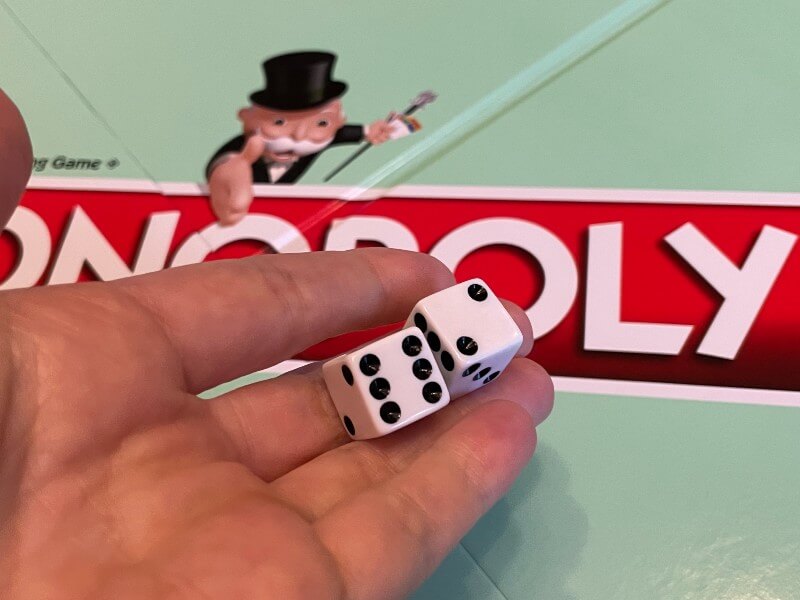
As long as there are no houses or hotels on any of the properties involved, you are allowed to trade color sets. If the properties have houses or hotels, you need to sell them back to the bank first.
This could be a good tactic if you’re up against a novice player who doesn’t know which color sets are the best. If you own the Reds, and another player owns the Oranges, you might want to suggest a trade.
It’s all about knowing which properties are the best… but I have more on that below.
You can trade mortgaged properties with another player. However, the new owner must pay interest on the mortgaged property. If they unmortgage it immediately, the interest is 10%. If they choose to wait, then when they unmortgage it the interest will be 20%.
Let’s use Boardwalk as an example as it’s a nice round number…
The mortgage value of Boardwalk is $200. So when you trade it to another player, they can either unmortgage it immediately for $220 ($200 + 10%), or if they choose to unmortgage it later, it’ll be $240 ($200 + 20%).
It’s really important you keep track of mortgaged properties for this reason and make sure players are paying the right amount to unmortgage them. It’s one of the most forgotten rules in Monopoly.
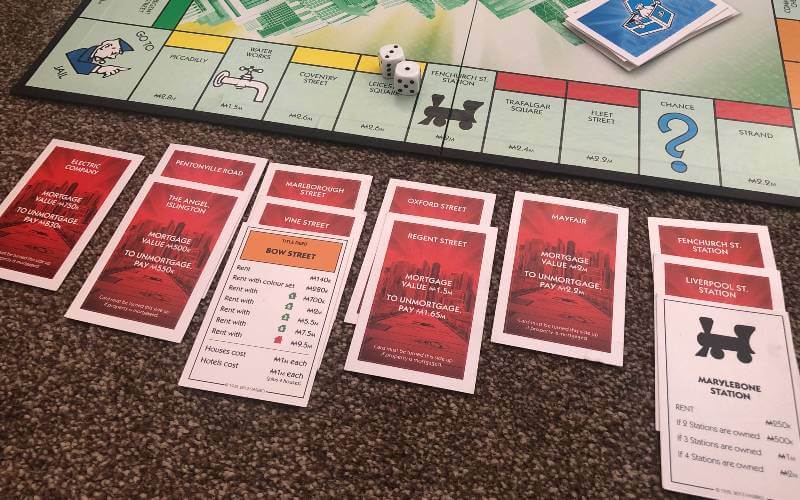
There are few things you can’t trade in Monopoly, but houses and hotels (and any properties with them) do fall into that category. If you want to trade a property with houses, you need to sell the houses to the bank first.
Houses are sold at half their value, which is why you need to be careful when buying them. Unlike properties, which you can buy back at the discounted rate (plus interest), buying houses then selling them is just throwing money away.
This is one of the few gray areas in Monopoly. Officially, if you land on a space and must pay rent but can’t afford it, you are bankrupt. But, the rules state you can trade at any time. Most people accept that you can trade properties to raise rent money, but you can’t pay with property.
This means that, if you owe rent to someone, you could sell them your properties and then return the cash to them as rent. But if they are low on cash themselves, you can’t give them property in lieu of payment, even if the value matches or exceeds the rent owed.
If you’re at the stage of the game where you have to trade properties in order to make a rent payment, it’s probably the beginning of the end for you anyway, unless you’re only trading properties that aren’t important to you, and you’ve got a good color set waiting to strike back.
You can make trades while in Monopoly jail. You can instigate them, or respond to a trade offer. The only disadvantage to being in jail is that you can’t move around the board, and that you may need to pay to release yourself if you don’t roll a double or have a Get Out Of Jail Free card.
And because those cards are tradeable, you could arrange a trade deal that includes receiving a Get Out of Jail Free card from another player. You might include it as part of a bigger trade, or just offer them an amount below $50 for their card, saving you the cash you would have to pay to release yourself normally.
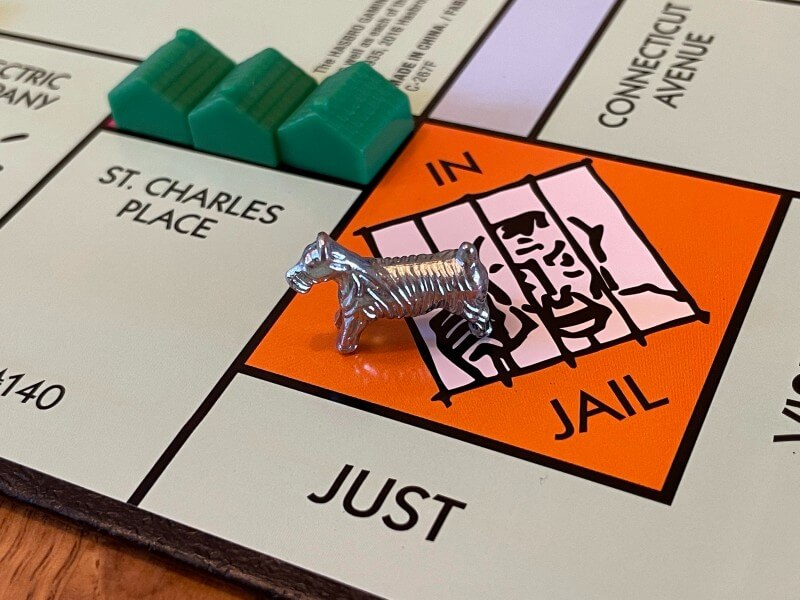
You never know how a game of Monopoly is going to pan out. You might have a color set that is your usual favorite, but you won’t be able to secure it every single time you play. You need to be flexible during the game and respond to it as it unfolds, and a huge part of that is having a strong trading strategy.
Trading randomly won’t work, because you’ll be out-maneuvered and end up without the better color sets. You need to know the best trading tactics and work with them as the game enters its latter stages to secure the deals that will seal your victory.
So, here are 10 key tactics you need to employ to make sure you carry out the best trades.
One of the best tactics when it comes to trading is to make sure you’ve got plenty to trade with. Aim to buy as many properties in the early game as you can afford, because you’ll be able to get them at market value.
Later in the game, when other players are trying to complete a color set, they’re going to be forced to make you an attractive offer for those properties. That might mean offering to help you complete a set in exchange for a property they need to finish one, or just paying you more than the value of the property, essentially earning you a profit.
By having a wider spread of properties across color groups, you’ve got more bargaining chips to use with all your opponents, which gives you more power in making the deals to get to the position you want to be in.
It’s important to know which are the best Monopoly properties to buy when it comes to trading. Especially if you’re up against someone who doesn’t know this information. You could put yourself into a really strong position if you can trade a ‘higher value’ property for one that is more useful along with a bit of cash.
The Orange properties are widely considered to be the best in the game because they offer a really high return on investment when you start building houses on them, but also because of their position on the board, being 6, 8, and 9 spaces after Jail. Because players will often be sent to Jail, they have a high probability of landing on the Oranges when they leave.
Meanwhile, the Green properties aren’t the best acquisition based on their return on investment. They’re good for the early game when they provide an 8.7% return; the second-best in the game. But, as you start adding houses, their ranking drops. With three houses they’re the second-worst color set for ROI, and with hotels they’re the worst.
Picking up a Green property could therefore be a smart tactic early in the game, as you could benefit from decent early returns before trading it for a more fruitful Orange or Light Blue property later in the game.
Sometimes, you won’t get a shot at the Oranges, so instead you might prefer a combo strategy. Pick up two color sets, one that’s cheap, like the Light Blues, and one that’s more expensive, like the Yellows. Build up the cheaper set first – it won’t ever win you the game but it’ll stifle your opponents’ building power and, over time, fund your houses on your higher-value set.
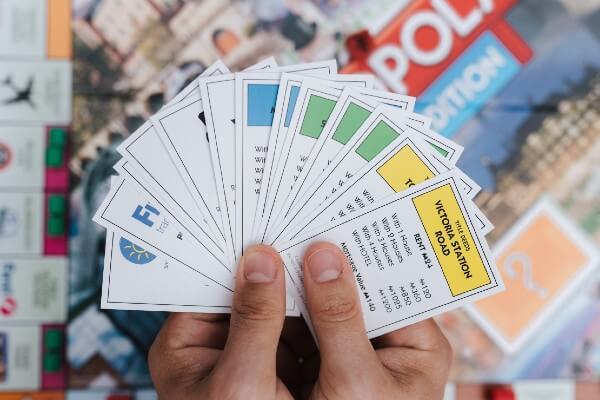
Knowing the players you’re up against is an important part of the bargaining process. If you can work out your opponents’ strategies then you can play to that when you set up a trade deal, and offer them something that has a higher personal value to them than maybe its straight financial worth.
Also, compare whether you’re playing in the real world around a table, or playing online. If playing in-person you can negotiate a lot more easily, which is why lowballing someone with a view to some upward mobility in your offer could be a good tactic. Bid low, and you might find that the point at which they’re happy to trade isn’t as expensive as you’d expect.
But try this tactic online and it’s unlikely to work. Trades online are naturally a little slower and involve less communication. If you keep trying to create a deal that’s of low value to the other player, they’re just going to keep rejecting it and get frustrated. And once you’ve annoyed someone, they’re much less likely to trade with you. For online deals, go in with the offer you think will be accepted the first time.
The timing of your trades is key. By evaluating the state of the board, and the position that every player is in, you can make some clever plays that could either get you a great bargain or prevent another player from gaining an advantage.
One example would be if a player is not having the best game, but is one away from a color set and has a bit of cash to build houses.
If you own the missing property, and another stronger player is approaching that color set on the board, you could help the weaker player complete their monopoly, taking something good in return and potentially damaging the stronger opponent too if they then landed on the set and owed the other player rent.
Of, if another player is building up a sizeable empire, you might want to ramp up your trade dealings with other players to try to take them on as a team, making sure you all have monopolies ready to keep the leading player in check.
Make sure you’re always aware of who owns which properties, where everyone is on the board, and try to use that information to time your deals.
The rules of Monopoly state that, if a player lands on a property owned by another player and can’t afford to pay them rent, they are bankrupt and all property they own passes to the player they owe rent to.
If you’re the third player in this scenario watching this unfold, suddenly you can be at a huge disadvantage. If your main rival suddenly boosts their portfolio by a couple of color sets, the tide can quickly turn against you.
With that in mind, target the players who are struggling, and offer them trades to take some of their property from them before they lose it due to bankruptcy. You may have to pay over the odds, but it’s better to keep them in the game a little longer than it is to allow your opponent to find themselves in a game-winning position.
An important rule in Monopoly that is sometimes overlooked is that you have to have your money on the table in plain view of all other players. It’s important that they can see a rough estimation of how much money you have. You don’t need to have it in piles by denomination, but you can’t hide cash in your pocket or under the table to surprise players later on.
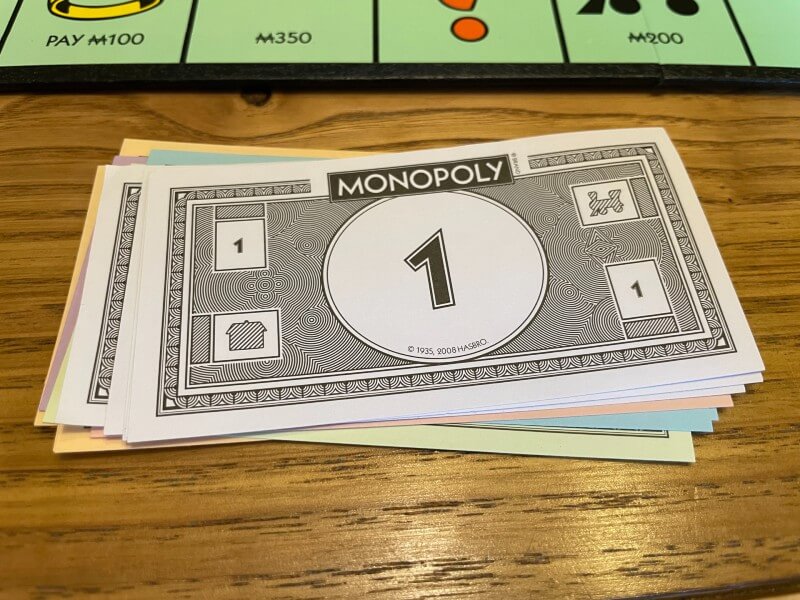
Use this to your advantage. If you can tell that a player doesn’t have much cash, then you might be more willing to trade them in a deal that sees them complete a color set, because they can’t then do much with it.
Color sets are great for building houses and hotels if you have the money, but if you don’t, then they’re not a huge risk to other players.
If you can see that another player is low on cash, you might be able to get a good deal out of them by trading them money too. So it’s good to always evaluate how much each player has, and work out how that would impact your trade deals.
A lot of people assume that you win Monopoly by having the most properties, but that’s not always the case. You should be prepared to sell properties for straight cash if it can move you into an advantageous position.
Say you own a color set already – ideally something like the Oranges – and two of the Pink properties. If you’re low on funds, try selling the two Pinks to the owner of the last Pink. Chances are you’ll be able to negotiate a high price, and you’ll have the money you need to add houses to your Orange properties.
This works exceptionally well if you time it too, so that you complete a deal like this when players are six to nine spaces from your properties. You can acquire the cash you need, spend it to upgrade, and then get it back through rent payments all in the space of a couple of turns.
I said earlier that trading randomly doesn’t work, but that doesn’t mean you should have a hard plan on exactly what you’re prepared to trade, because no game of Monopoly is ever the same.
If you go into a game thinking you’ll own either a Pink, Orange, or Red and then trade for the others, that plan falls apart if you just never land on those spaces, and you don’t win one in an auction.
So plan, but do so in a way that you can react to how the game unfolds. Have a few different options that you can look at, depending on the way the dice are falling and what other players are doing.
Monopoly is like chess in a way: you need to understand the theory but apply it based on what happens, instead of knowing exactly what you’re going to do from the first roll.
One of the advantages of playing in person is that Monopoly becomes a very communicative game. Use that, and keep in regular conversation with other players. Tell them that, if player A makes a certain deal with you, then you’ll be able to offer Player B a certain trade after that.
This can start to turn players against each other as they try to work out the most advantageous deal. You can make clear your plans to acquire a color set, but through explaining your offer make sure that other players don’t complete a trade for a property that you’ve got your eye on.
And here’s the best bit – the only trades you have to commit to are the ones you are currently settling. You might tell Player B that you’ll later offer them a certain property if they leave Player A’s properties to you, but then you might ‘change your mind’.
If it sounds manipulative, that’s because it is – the best Monopoly strategy is all about using every (legal, according to the rules) tactic to win.
This ties into that last point. Trading in Monopoly doesn’t have space for sentimentality, unless you’re playing with the kids and want to just show them the ropes.
Try to avoid making a deal with someone if it’s clearly not good value for you, just because they’re losing or you want them to do better. Nobody likes to win a game that was clearly weighted in their favor, and all you’ll do is upset the other players.
Unless someone is taking the game way too seriously and being a bit of a jerk about it – in that case, absolutely help other players out over them if you want to!
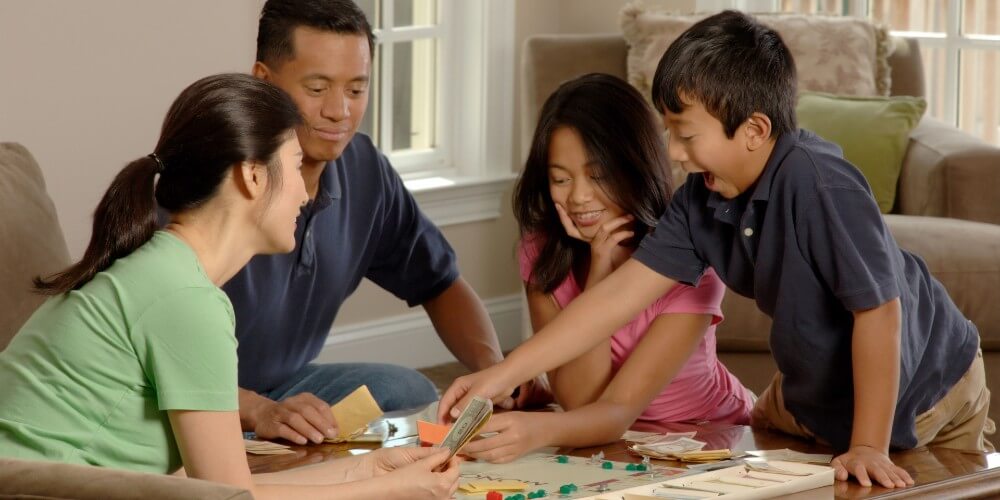
The best way to win in Monopoly is to pick up enough properties in the early stages to give yourself bargaining power, and then plan which strategy you want to employ based on how the game’s unfolding.
Because some players aren’t confident with trading, you can take advantage of that when you know the rules and tactics involved. By being bold and decisive, you can convince players of deals that might not be the best value for them.
That doesn’t mean being super-dominating and intimidating, but just by kicking off trading and doing it regularly you can help encourage other players to open up and potentially swap properties and cash with you.
Plus, trading could be your last lifeline when you run out of money in Monopoly – and may just keep you alive in the game.
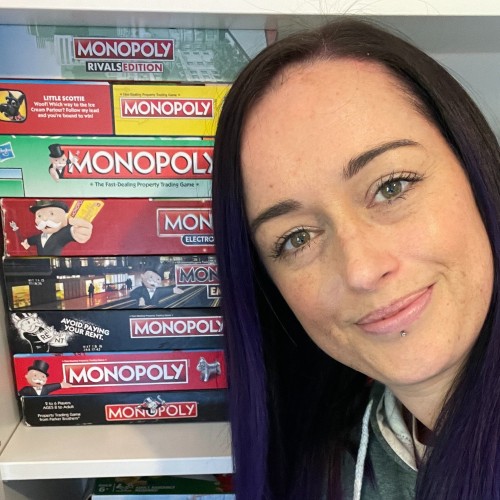
Jenni Fielding is the founder of Monopoly Land - an unofficial fan site. She has been a huge fan of Monopoly and has been playing the game for over 30 years. She is a stickler for the rules and loves to find vintage Monopoly sets in second-hand shops.